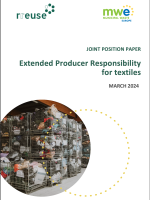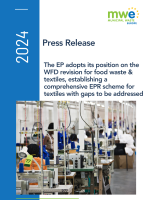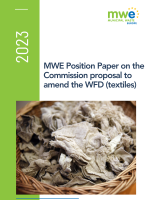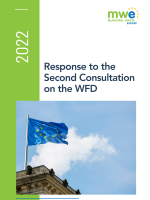ENVI vote on Waste Framework Directive (WFD)
Yesterday the European Parliament’s Environment (ENVI) Committee approved with majority Rapporteur Zalewska’s report on the revision of the Waste Framework Directive, taking a decisive step towards improving textile waste management and preventing food waste.
Municipal Waste Europe’s members will be responsible for organising the separate collection of textile waste come 1 January 2025 and we are pleased that Members of the ENVI Committee have clarified several issues of key important to enabling this to take place effectively and efficiently.
ENVI Committee anticipates the deadline for a mandatory Extended Producer Responsibility (EPR) from 30 months, proposed by the EU Commission, to 18 months after the entry into force of this revision in the attempt of narrowing the gap between the mandatory separate collection of textiles and EPR. Despite this is a positive step forward, it does not completely solve the economic burden imposed on municipalities who will invest (or have been already invested) in necessary infrastructure.
Producers will have to cover, among other aspects, the communication work. This is of paramount importance to promote textile waste prevention and efficient separate collection. However, we believe the Polluter-Pays Principle is not fully considered when the cost of collection and treatment of the share of textiles that remains in mixed stream is left out. Very importantly, whereas the Commission had narrowed the EPR obligation to only household textile, ENVI Committee has widened the scope to all post-consumer textiles. This is a great enhancement, nevertheless, unsold textiles and industrial textile waste are missing in this revision and in the amendments proposed.
Parliament has introduced the obligation for municipalities and social enterprises to be included in the decision- making processes of EPR schemes alongside textile producers which will ensure that all responsible parties will co-design implementation. Other amendments that are important to municipalities that ENVI Committee has brought to the Commission’s proposal include the definition of waste collected in bins or bags on the street as waste, regardless of the type of collector – this ensures traceability and enables the limitation of illegal waste shipments, the definition of social enterprise, the clarification that social enterprises come under the EPR schemes and have an obligation to deliver any non-reusable textile waste to the Producer Responsibility Organisation (PRO) for recycling.
To ensure a sound legal basis for investment in textile sorting, fibre opening and re-spinning plants, it is necessary to have clear rules for all in the value chain. The consumer is a key member of this value chain and cannot be expected to decide whether their apparel, shoes or accessories are reusable, recyclable or waste. This is a decision for highly trained professionals in sorting installations who understand quality and market parameters.
European legislation on waste has always been technology neutral for good reason; subsidiarity and the fact that waste is a local problem requiring local solutions. Hence the EU level has to date focused on targets, methods and calculations. The ENVI Committee departs from this by proposing mixed waste sorting of residual mixed waste as an option to encourage. On the one hand this can easily weaken the ability of this legislation to deliver a circular economy as it would detract from the setup of separate collection systems focused on delivering high quality and quantity of reusable, recyclable materials in high landfilling countries and on the other hand, countries with high recycling rates have such low quantities of recyclables left in their residual waste that such an investment would be financial and environmental nonsense.
We thank the Rapporteur and Environment Committee for their work and await news from Council.





